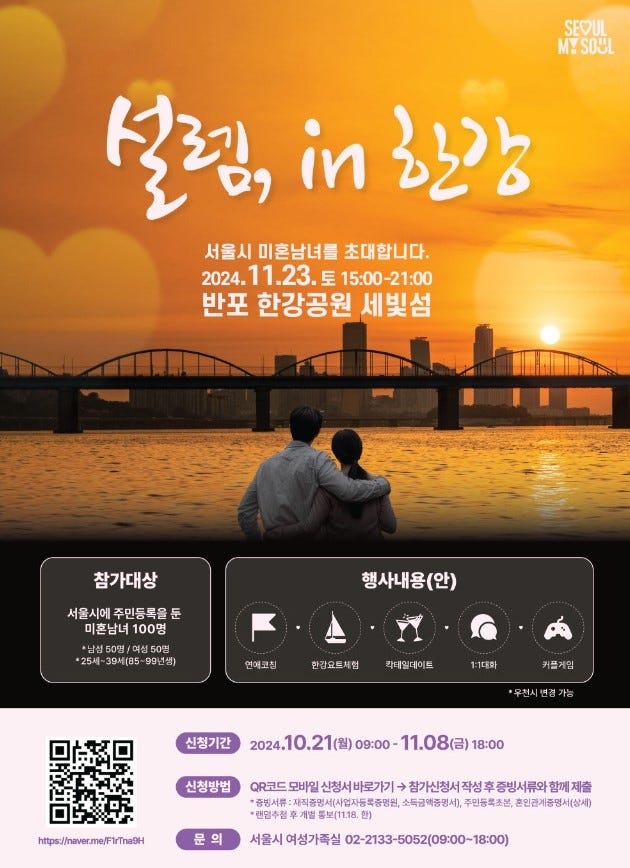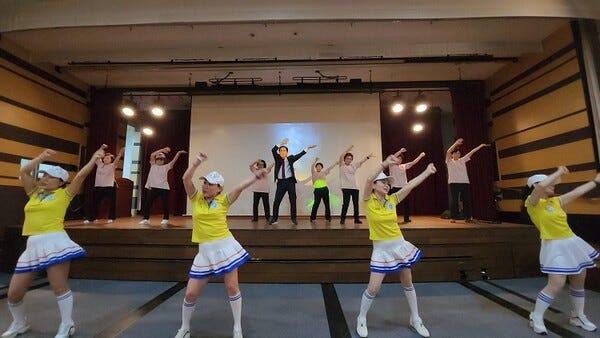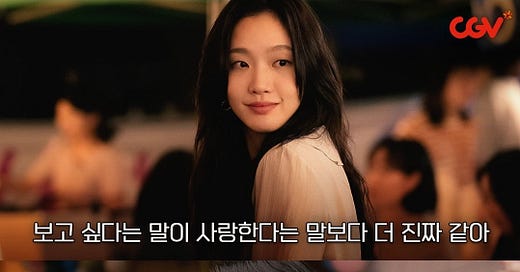Surviving in a Country That’s Rightfully Going Extinct
Government-hosted dating events and a dance for fertility
안녕! It’s Ari, your chatty Korean friend and weekend reminder. 🎉 I took a break for two weeks due to dry eyes. After using lots of artificial tears and with digital detox, I feel much better now.
Today’s newsletter covers the “best” birth rate boosting programs in my country and a mini Korean lesson with a viral movie quote. No food recipe, but I prepared a song recommendation. Let’s dive in!
Surviving in a Country That’s Rightfully Going Extinct
With South Korea’s birth rate at a record low of 0.72, the government has introduced a series of ambitious policies to encourage marriage and family-building. Among these, I’ve selected the “best” programs or proposals that stand out for their creative and dedicated approaches to the challenge. Here are the top three winners.
🏆 Third Place Award: Government-Funded Dating Events

The third-place award for “best” policies aimed at boosting South Korea’s birth rate goes to government-funded dating events. One of the most prominent examples is Seoul’s latest matchmaking initiative, Seolleim (meaning “heart fluttering”) in Han River. 👆 Set for next month at the Han River’s Sebitseom, this event will bring together 100 single men and women aged 25 to 39 for yacht tours, social activities, and one-on-one conversations. Couples who connect will receive dating vouchers worth up to 10 million KRW (about $7,400 USD) to support their future meet-ups.
Across the country, around 100 local governments have hosted similar events in efforts to address the declining birth rate. Ranging from cooking classes and wine parties to extended, reality show-inspired stays, these programs last from one day to a month. However, due to a shortage of female participants, some local offices have required female public employees to fill participant quotas. According to a report, 14 out of 15 female participants in a 2022 dating event in Haenam were compelled to join to meet these quotas, with 8 of them being public health center employees.
🏆 Second Place Award: Female Conscription
The second-place award goes to the proposal for female conscription as a birth rate solution. This idea was introduced by Kim Hyung-chul, head of the Korea Research Institute for Military Affairs, who argued that conscripting women could boost marriage rates and encourage childbirth. Kim suggested that shared living spaces, akin to university dormitories, might foster connections and romantic feelings between male and female soldiers. 🙃 Though criticized as an unrealistic approach to addressing low birth rates, this idea has sparked significant public debate and drawn both interest and backlash.
🏆 First Place Award: Joigo Dance

Finally, the first-place award goes to the Joigo Dance. (Joigo means “tightening” in Korean) Introduced by Seoul City Councilor Kim Yong-ho, this initiative is based on Kegel exercises, with the goal of enhancing fertility by strengthening pelvic muscles. Kim proposed that this dance could promote better reproductive health, positioning it as a creative approach to South Korea’s low birth rate challenge. In recognition of his efforts, Kim was awarded the Ministry of Health and Welfare’s Wellness Award. 🫠
Mini Korean Lesson: I Want to See You ❤️
The film Love in the Big City (대도시의 사랑법), adapted from Sang Young Park’s novel, follows the story of Jae-hee, a free-spirited young woman, 👆 and her close friend Heung-soo, a gay man. Meeting as university classmates, the two form a deep bond, navigating love, hardships, and the challenges of adulthood.
Several quotes from Love in the Big City recently went viral in South Korea, resonating with audiences who connected with the raw honesty of the characters’ experiences. Here’s one of those memorable quotes:
“보고 싶다는 말이 사랑한다는 말보다 더 진짜 같아. 사랑은 너무 추상적이고 어려운데, 보고 싶다는 참 명확해.”
I asked ChatGPT to translate this, and here’s the translation it provided:
“Saying ‘I miss you’ feels more genuine than saying ‘I love you.’ Love is too abstract and difficult, but ‘I miss you’ is so clear.”
While ChatGPT translated 보고 싶다 as “I miss you,” the phrase literally means “I want to see you” in Korean. This distinction is significant—보고 싶다 conveys a straightforward, immediate desire to see someone, which can feel more direct and heartfelt. Unlike “I miss you” in English, which implies noticing someone’s absence, the Korean phrase emphasizes a desire for presence, making it feel more intimate. This is why the heroine of the movie finds 보고 싶다 more genuine—it’s not just a sentiment; it’s a straightforward expression of wanting to be with someone.
So, when you listen to Spring Day by BTS (the song famously opens with this phrase) or when you come across 보고 싶다 in any Korean dramas or movies, remember today’s lesson to appreciate the true sentiment behind the words. 💕
I’d like to end with a memorial song dedicated to the victims of the Itaewon tragedy. Titled 별에게 (To My Star), 👆 the song was introduced at the second-anniversary memorial event this Tuesday. South Korean singer Harim performed the song, which was written by Choi Jung-joo, father of 22-year-old victim Choi Yujin. She was a singer who lived in Itaewon. The lyrics are as follows: “I still cannot let you go / You still, you breathe within me… / I must see you again / You alone, you are my heart.” 🕊️
Thanks for reading! 🥰 If you’d like to help me keep writing, consider buying me a coffee! ☕️ I’ll be back next week with more. 안녕!





These are amazingly awful ideas, and your presentation of them is perfect! This is one of the reasons I enjoy your posts so much, because you see the ridiculousness around you. People always want to fix problems, but most people have a horrible analysis of what the problem is. These ideas reveal that these men don't want to look at the root causes for the lowered birth rate. They offer solutions to problems that don't exist (like poor reproductive health habits or men and women not being able to meet) instead of looking at problems that do exist (like the unequal status of men and women, and all the patriarchal institutions that terrorize women), because fixing those problems are 1) difficult and 2) undesirable to them.
Have faith! Change and progress will come if you all keep fighting for it. You're doing a great job raising awareness and sharing your views with the world at large. I'm rooting for you.